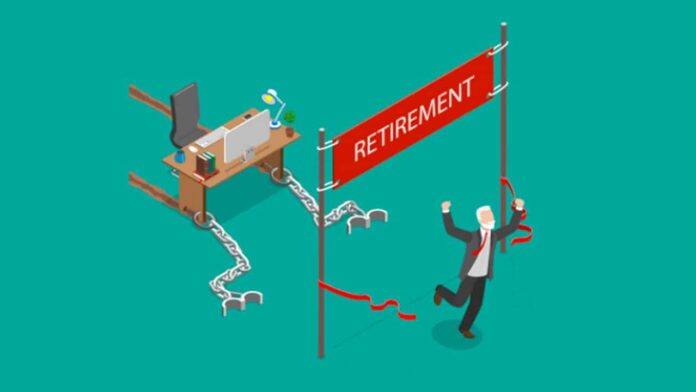Create your very own Auto Publish News/Blog Site and Earn Passive Income in Just 4 Easy Steps
How much should I have saved for retirement by the time I'm 25? And by the time I'm 35 or 45?
It's relatively easy to know when you've achieved certain financial goals, like building your emergency fund or paying off your high-interest debt. But what about your retirement savings? Exactly how MUCH should you have saved for retirement now or at any point in your life?
This question is difficult to answer for two main reasons.
Firstly, everyone has a different income. And secondly, there are very different ideas about what retirement should include. So how do you calculate how much you should have saved?
Let’s dive in!
Are you on track with your retirement planning?
There are different ideas about when you should retire and how much you should have saved, but I have chosen to base the numbers below on JP Morgan Asset Management's Annual Guide to Retirement.
The report provides solid benchmarks for anyone planning for retirement. The following numbers are based on several assumptions. Here are the report's assumptions:
If you make $90,000 or less per year, the report assumes you have an annual savings rate of 5%. But if you make more than $100,000 per year, the report expects your gross annual savings rate to be double that, at 10%, starting today.
This is an important point because it means that JP Morgan’s retirement targets for 25-year-olds earning six-figure salaries are actually lower than those with a five-figure salary should have saved by age 25. In almost all other cases, however, the report recommends saving a higher percentage of increasing income if one wants to maintain a comparable lifestyle in retirement.
How much should you have saved for retirement?
Of course, your situation may look different than the assumptions above. But these benchmarks are still a good starting point for your retirement planning. Let's break down the numbers that show how much you should have saved for retirement based on your age.
At 25 years old
At 25, you may not be thinking much about retirement. But starting early is an important part of building a healthy financial future. Here's how much you should have saved based on your income:
|
Checkpoint (X current income) |
Retirement savings goal |
|
|---|---|---|
* Personally, I don't like JP Morgan's math here – especially for the higher earners. Yes, it's probably your first job and you've only been earning this much for a year or two, but with an income of $100,000, I think you can have at least $25,000 saved by this point (because hopefully you've been saving since you were 16).
At 35 years old
As you reach your thirties, you may be thinking a little more about your retirement savings. Here's what you should have saved by 35:
|
Checkpoint (X current income) |
Retirement savings goal |
|
|---|---|---|
* I like these numbers a little better because I think they are a pretty accurate representation of how much you should have saved for retirement by age 35.
At 45 years old
In your mid-forties, you may be feeling the growing pressure to keep your retirement savings on track. Here's how much you need to have saved:
|
Checkpoint (X current income) |
Retirement savings goal |
|
|---|---|---|
At 55 years old
By your mid-fifties, you may be ready to retire. Since you're so close to the finish line at this point, it's important to stay on track:
|
Checkpoint (X current income) |
Retirement savings goal |
|
|---|---|---|
At 65 years old
Finally, you've reached the finish line. When you factor in Social Security, you can see how much you'll need to replace your income in retirement, according to the JP Morgan Guide to Retirement.
|
Checkpoint (X current income) |
Retirement savings goal |
|
|---|---|---|
What if I have unique retirement plans?
Do you plan to spend more than you earn in retirement? Do you want to travel more? Or do you plan to spend significantly less in retirement? Then you may need to rethink your retirement savings.
Read “How Much Money Do I Need to Retire” by Todd Tresidder to solidify your individual savings plans.
What if I want to retire early?
You may be interested in the Financial Independence Retire Early (FIRE) movement, which many advocate as a way to leave paid work that you don't enjoy behind before your mid-60s.
When you pursue FIRE, you need to create a different savings plan for retirement. The traditional savings goals you would need to achieve for a normal retirement age must be thrown out the window when you pursue FIRE.
Before you choose FIRE, learn about it and the massive savings it requires. For more information about the movement, visit The College Investor.
The conclusion
Saving for retirement can seem like an overwhelming task. But if you break it down into milestones based on your age and income, it can seem more manageable.
If you are unsure if you are on the right path, you should consult a financial advisor to work out the details of your savings and investment plans.
Remember, it's never too late to open an IRA account to start saving for retirement. And if you're a freelancer or small business owner, consider opening a Solo 410k or Self-Employed IRA to reach higher contribution limits.
Create your very own Auto Publish News/Blog Site and Earn Passive Income in Just 4 Easy Steps






